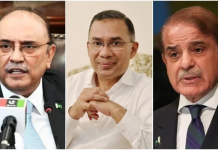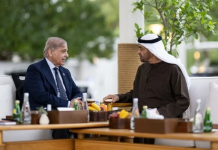ISLAMABAD, OCT 19 (APP/DNA): Federal Minister for Planning, Development and Special Initiatives/ Deputy Chairman of the Planning Commission Professor Ahsan Iqbal chaired a meeting of the Central Development Working Party (CDWP) that approved 18 development projects across critical sectors of national growth.
“Development is not just about projects; it is about people, performance, and purpose. Every initiative we approve today must translate into a better tomorrow for Pakistan,” Ahsan Iqbal said while chairing the meeting, a news release said on Sunday.
He emphasized that Pakistan’s development strategy is rooted in Vision 2025 and Uraan Pakistan’s 5Es Framework—Exports, E-Pakistan, Energy & Infrastructure, Environment, and Equity & Empowerment—which together aim to transform the country into a competitive, inclusive, and knowledge-based economy by 2047.
Out of the taken up projects at the CDWP forum, twelve projects worth Rs35.4 billion were approved, while six projects amounting to Rs280.2 billion were recommended to the Executive Committee of the National Economic Council (ECNEC) for consideration.
The meeting was attended by Secretary Planning Awais Manzur Sumra, the Vice Chancellor of PIDE, the Chief Economist, and senior representatives from federal ministries, provincial departments, and development partners.
The agenda focused on projects in food and agriculture, governance, health, higher education, housing, social welfare, power, transport, and water resources—reflecting the government’s multi-sectoral approach to national progress.
Recognizing agriculture as the backbone of Pakistan’s economy and the cornerstone of food security, the CDWP approved transformative initiatives designed to modernize farming, strengthen value chains, and promote climate resilience.
The flagship project, Punjab Resilient and Inclusive Agriculture Transformation (PRIAT), worth Rs. 68.67 billion, was referred to ECNEC. Ahsan Iqbal stressed the need to align the initiative with measurable outcomes and past cluster-based studies to enhance value addition and export orientation in agriculture, remarking that every drop of water and every acre of land must translate into prosperity, not just production.
In the same sector, the National Program for Animal Disease Surveillance and Control, worth Rs 7.35 billion, was approved to enhance Pakistan’s compliance with international sanitary standards and boost livestock exports.
Additionally, the Punjab Climate Resilient and Low Carbon Agriculture Mechanization Project (P-CLAMP), worth Rs 36.12 billion and financed by the Asian Development Bank (ADB), was referred to ECNEC.
Under the governance reforms agenda, the Punjab Resource Improvement and Digital Effectiveness (PRIDE) Program, worth Rs3.08 billion, was approved.
The health sector witnessed three crucial projects approvals reflecting Pakistan’s commitment to universal healthcare and child welfare. Projects included the National Health Support Program (Rs. 2.17 billion), Extension of Child Health Facilities in Southern Punjab (Rs. 6.40 billion) funded by JICA, and D-TALK & Insulin for Life (Rs. 1.39 billion) funded by XEM Korea. Minister Ahsan Iqbal underscored that each rupee invested in health must yield tangible outcomes, noting that Pakistan’s fiscal space is limited and borrowed resources are a trust from future generations.
He instructed the Government of Khyber Pakhtunkhwa to integrate diabetes initiatives with the National Diabetes Program to maximize national health impact.
In pursuit of knowledge-driven economic growth, the University of Veterinary and Animal Sciences (UVAS) Campus Project in Pattoki, valued at Rs1.46 billion, was approved.
The Construction of a Wastewater Treatment Plant at Babu Sabu, Lahore, worth Rs. 52.19 billion, marks a historic step particular in Punjab and as a whole for Pakistan’s environmental infrastructure development.
Financed by AFD, the project will treat 88 MGD of wastewater using biogas, solar integration, and advanced sludge management systems to reduce pollution and protect the River Ravi ecosystem. Ahsan Iqbal called it a project that should have begun two decades ago but is now essential to ensure clean cities and a sustainable environment.
Three hydropower projects in Azad Jammu and Kashmir were approved to harness local resources and provide clean, reliable energy.
These include the Phullawai Hydropower Project (3 MW), the Khurshidabad Hydropower Project (2.71 MW), and the Naushera Hydropower Project (1.95 MW). These small-scale renewable energy projects underscore Pakistan’s commitment to the Energy and Infrastructure pillar of Uraan Pakistan, strengthening AJK’s local energy production.
The Strengthening Social Protection Delivery System, Sindh, amounting to Rs. 64.4 billion and co-financed by the World Bank and the Government of Sindh, was referred to ECNEC.
Three projects under the Transport & Communications sector were discussed to revolutionize connectivity and logistics efficiency. The Bus Rapid Transit (BRT) Quetta feasibility study, worth Rs. 1.24 billion, was approved to improve urban mobility in Balochistan’s capital.
The Preliminary Design and Drawings for ML-1 and Havelian Dry Port, worth Rs. 16.26 billion, was referred to ECNEC—a vital step toward modernizing Pakistan’s railway backbone under CPEC Phase-II.
Emphasizing the urgency of this mega project, the planning minister stated that ML-1 is not just a railway upgrade; it is Pakistan’s leap into the 21st century, adding that while the world is moving towards electric trains, Pakistan must modernize to stay competitive.
He urged Pakistan Railways to implement business plan and commercialize its vast land assets to self-finance infrastructure upgrades to ensure sustainable operations
The CDWP also approved the Detailed Engineering Design of ML-1 Rohri–Khanpur–Multan Section, amounting to Rs. 3.21 billion, through ADB financing support, marking a milestone in advancing CPEC’s transport connectivity agenda.
Two critical water sector projects reaffirmed Pakistan’s resolve to secure its water future.
The Kachhi Canal Restoration Project, worth Rs. 5.65 billion, will repair flood damages and restore irrigation capacity, while the Khyber Pakhtunkhwa Irrigated Agriculture Improvement Project, worth Rs. 50.95 billion and financed by the World Bank, will improve water efficiency through modern irrigation systems, community watercourses, and high-efficiency technologies across merged districts.
These initiatives directly address the Environment and Climate Change pillar of Uraan Pakistan, ensuring resilient agriculture and sustainable water management.

















